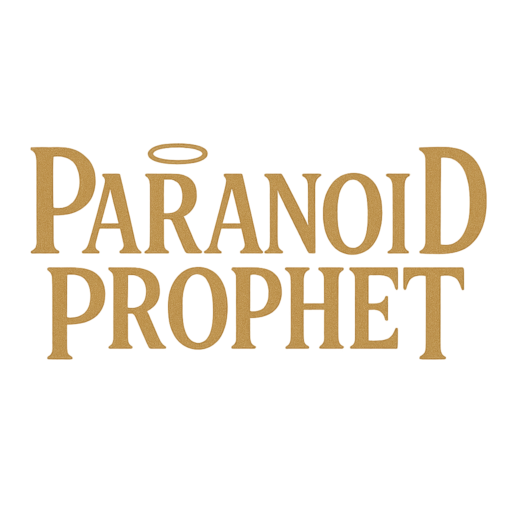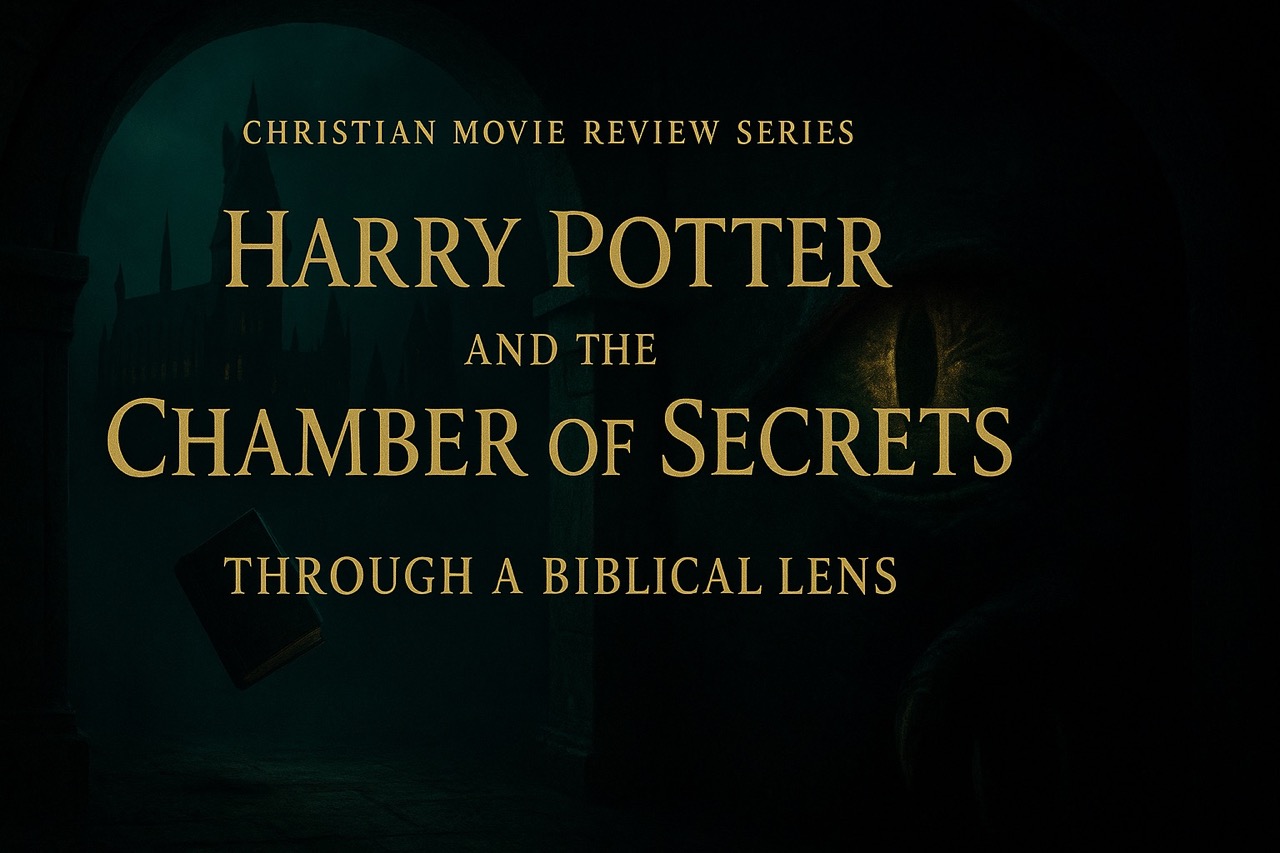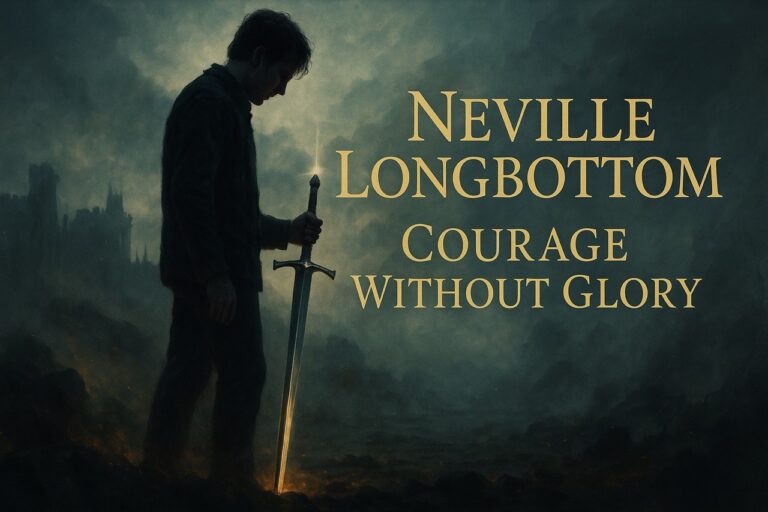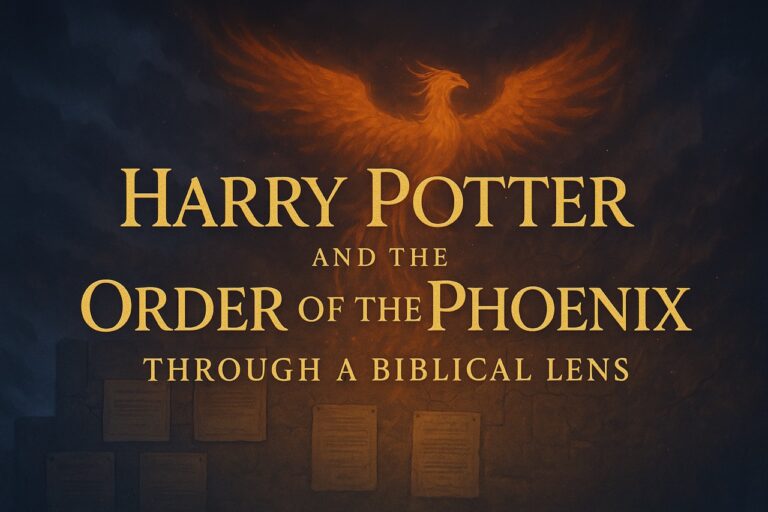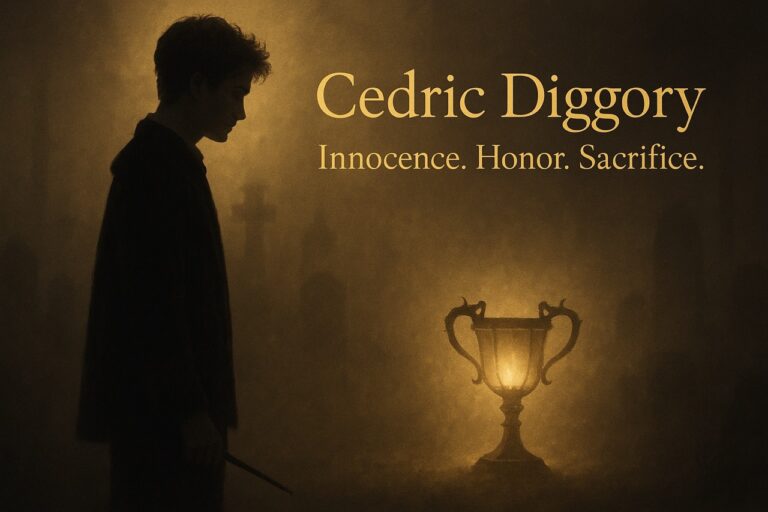This Chamber of Secrets biblical review explores what lies beneath the surface of the second Harry Potter film — and it’s darker than you might remember. While magic and fantasy still fill the frame, the real heart of the story centers on hidden evil, pride, and identity. As Harry faces mysterious attacks and whispers about being “the Heir of Slytherin,” Christian viewers are invited to examine deeper questions: Can darkness dwell within someone chosen for good? Can evil masquerade as wisdom? And what happens when truth is buried in secrecy? In this review, we’ll offer a thoughtful Christian perspective on the film’s symbolism, moral tension, and moments of redemptive light — while also helping parents discern whether this darker chapter is right for their children.
🧒 Parental Guide – Chamber of Secrets Biblical Insights
Suggested Viewing Age: ★★★★☆ (9+)
Parental Guidance Rating: PG (with discernment advised)
Chamber of Secrets dives deeper into darkness than the first film. With disturbing scenes, supernatural possession, and serpent symbolism at the forefront, this installment can feel emotionally heavier — especially for younger viewers. The tension is higher, the villains more insidious, and the themes more morally complex.
💬 Topics to Discuss as a Family:
- Hidden sin & secret evil – The Chamber and the basilisk represent sin hiding beneath the surface (Psalm 19:12; Luke 12:2).
- Spiritual identity & temptation – Harry fears he might be inherently evil because of his gifts. Talk about how identity is defined by God, not fear or talent.
- Deception vs Truth – Tom Riddle appears as a helper but is the enemy in disguise — a picture of false light (2 Corinthians 11:14).
- Pride & false teachers – Gilderoy Lockhart is charming but hollow, reminding us of self-serving leaders who look wise but lack truth (Matthew 7:15).
🚫 Content Warnings:
- Possession/dark magic – Ginny is controlled through a diary (symbolic of demonic influence or spiritual deception).
- Petrification & fear – Students and animals are paralyzed by an unseen monster, creating tension and anxiety.
- Snake/serpent imagery – Strong serpent themes (basilisk, Parseltongue, Slytherin) can be uncomfortable for viewers sensitive to Genesis 3 parallels.
- No spiritual accountability – Once again, no mention of God, sin, or absolute moral authority. “Right” and “wrong” are based on feelings or personal choice.
🗣️ Family Discussion Questions:
- Why does Harry worry he might be evil? What does the Bible say about identity and the heart?
- How does Tom Riddle deceive people? How does that compare to the enemy in Scripture?
- What does the film say about bravery, truth, and loyalty? How do those values match up with the Christian life?
- How can we enjoy stories like this while still guarding our hearts spiritually?
🧠 What This Chamber of Secrets Biblical Review Reveals
The second time around, Chamber of Secrets isn’t just darker — it’s more spiritually loaded.
On the surface, it’s a mystery about a hidden monster and school legend. But rewatching with a biblical lens reveals a powerful undercurrent of identity crisis, spiritual deception, and hidden evil — all wrapped in symbols that mirror deeper truths.
🐍 Harry’s Identity Crisis Echoes Spiritual Doubt
Harry begins to wonder: What if I’m not meant to be good?
He speaks Parseltongue like the villain. The Sorting Hat nearly placed him in Slytherin. His classmates suspect he might be the Heir of Slytherin — the one causing the attacks.
This echoes a familiar spiritual fear: Am I too broken? Too far gone? Am I secretly bad on the inside?
But the story — like the gospel — answers this fear not with denial, but with grace and truth. Harry’s choices, not his traits, define him. Dumbledore’s line, “It is our choices… that show what we truly are,” mirrors biblical truth: “By their fruit you will know them” (Matthew 7:16).
📓 The Diary as a Symbol of False Revelation
Tom Riddle’s diary is one of the most spiritually dangerous objects in the entire series — and it’s treated that way.
It’s seductive: it listens, understands, reveals secrets. But it’s also a trap. It doesn’t just influence Ginny — it possesses her. Slowly. Subtly. Until she loses control.
This is a chilling picture of how false teachings, spiritual influences, or even occult curiosities can enter through what seems “harmless” and grow into something destructive.
The diary reflects 2 Timothy 3:13: “Evil people and impostors will go from bad to worse, deceiving and being deceived.”
🪞 Evil Doesn’t Look Evil at First
Tom Riddle appears kind. Charismatic. Polite. Even helpful. He wins Harry’s trust… right before revealing he is Voldemort.
This moment is a wake-up call — not just in the story, but spiritually. Evil often hides in charm, beauty, or authority. The Bible warns that Satan masquerades as an angel of light (2 Corinthians 11:14), and Tom is a textbook example.
💨 Lockhart: A False Teacher in Fancy Robes
Gilderoy Lockhart is another danger — not because he’s evil, but because he’s fake.
He takes credit for others’ accomplishments. He’s loud, proud, and adored by the public — but when real trouble hits, he vanishes.
Lockhart is a soft rebuke for Christians: Do we follow leaders who sound good? Or those who live in truth?
This rewatch reveals that Chamber of Secrets isn’t just a fantasy sequel. It’s a cautionary tale about deception, pride, misplaced identity, and the spiritual war behind the scenes.
✝️ Biblical Truths in Harry Potter and the Chamber of Secrets
Even in a story built on magic and myth, Chamber of Secrets unexpectedly echoes deep spiritual truths — especially when viewed through a discerning lens.
💔 Self-Sacrifice Still Wins
Once again, it’s sacrificial love that defeats evil — not power, not talent. Harry risks his life to save Ginny. Fawkes the phoenix blinds the basilisk and brings healing through tears. The moment isn’t loud or flashy — it’s soft, symbolic, and redemptive.
“Greater love has no one than this, that someone lay down his life for his friends.” – John 15:13
🛡️ Spiritual Armor in the Form of Loyalty
Harry receives aid not through magic spells, but through character: his loyalty to Dumbledore summons Fawkes. This mirrors how biblical faithfulness opens doors for God to act on our behalf — not because of superstition, but because loyalty aligns us with truth.
🧭 Truth Overcomes Lies — Eventually
Though deception dominates most of the movie, it collapses under the weight of truth. Riddle’s identity is exposed. The lies he told through the diary are undone. Even Ginny, broken and ashamed, is restored when the truth comes out — a beautiful echo of confession, redemption, and grace.
“You will know the truth, and the truth will set you free.” – John 8:32
🐍 The Basilisk and the Power of Sin
The basilisk — a serpent that kills with a glance — feels like a physical representation of sin’s deadly power. You don’t have to touch it. Just look. Just entertain it. And it can freeze or destroy.
The only weapon that kills it? A sword that appears when Harry proves worthy — not unlike how spiritual weapons appear when we walk in faith (Ephesians 6:10–17).
⚠️ Where Chamber of Secrets Clashes with Scripture
Even with moral echoes, Chamber of Secrets still presents clear theological conflicts that Christian families should address.
🧙♂️ Magic Is Still Treated as Natural or Good
Once again, witchcraft is the world’s default language. Spells, potions, and enchantments are tools of education and empowerment. There is no distinction between light and dark magic based on source or spirit — which directly opposes Deuteronomy 18:10–12, where God warns His people not to dabble in divination.
🧬 Spiritual Identity Is Treated as Internal and Mysterious
Rather than being rooted in God or eternal truth, identity here is based on choice, ability, or fear. Harry worries he might be evil simply because of shared traits with Voldemort. The film says, “It’s our choices…” — but Scripture says our hearts are deceitful, and we need a new one (Jeremiah 17:9, Ezekiel 36:26).
📖 Revelation Comes Through Dangerous Channels
Ginny learns things from a possessed diary. Harry learns through visions and magical artifacts. There’s no mention of prayer, Scripture, or godly wisdom. Revelation in this world comes through object-centered mysticism — a dangerous model that glamorizes spiritual shortcuts.
🧠 Truth Without Repentance
Tom Riddle is revealed as Voldemort, and his lies are exposed — but no one repents. No one turns to a higher truth. There is no spiritual resolution — only the defeat of one evil through personal bravery. The story ends without a sense of moral judgment or accountability to anything beyond the self.
These tensions don’t mean the story has no value — but they require discernment. Watching through a biblical lens helps us engage with the material without letting it shape our worldview.
✝️ Final Reflection: A Chamber of Secrets in Us All
Chamber of Secrets may be a fantasy, but it confronts something real — that evil often hides beneath the surface, even in those who seem chosen for good. Harry’s fear that he might be the villain mirrors a question we all face: What lives in the secret places of our hearts?
Through the story’s flawed lens, we still glimpse truth — about sin, sacrifice, deception, and redemption. But it’s only a shadow of the gospel. In Scripture, our worth doesn’t come from bravery or talent. It comes from the One who entered our chamber of sin and conquered the serpent once and for all (Genesis 3:15, John 3:16).
So should Christians watch Harry Potter and the Chamber of Secrets? With discernment, wisdom, and the Word of God in hand — perhaps. But never without asking the deeper questions.
🔗 Christian Reviews of Harry Potter and the Chamber of Secrets
1. Plugged In (Focus on the Family)
A balanced review noting both positive elements, such as the exposure of vanity through Gilderoy Lockhart’s character, and concerns about the portrayal of magic and spiritual content.
🔗 https://www.pluggedin.com/movie-reviews/harrypotterandthechamberofsecrets/
2. Christian Answers
A critical perspective highlighting the film’s glorification of the occult and its potential negative influence on impressionable minds.
🔗 https://christiananswers.net/spotlight/movies/2002/harrypotterchamber.html
3. Movieguide
Analyzes the film’s strong occult worldview and nominalistic philosophy, noting that these elements overshadow the movie’s moral messages and Christian symbols.
🔗 https://www.movieguide.org/reviews/movies/harry-potter-and-the-chamber-of-secrets.html
4. Just an Apprentice (John Granger)
Offers an allegorical interpretation, viewing the story as a Christian morality play with characters and elements symbolizing aspects of salvation history.
🔗 https://justanapprentice.wordpress.com/2007/08/17/harry-potter-chamber-of-secrets/
5. CBN (Christian Broadcasting Network)
Acknowledges the film’s spiritual themes but criticizes its alignment with Christian theology, suggesting it imparts false messages and beliefs.
🔗 https://cbn.com/article/not-selected/harry-potter-and-chamber-secrets-movie-review
6. Fuller Studio
Discusses the theme of secrecy in the film, relating it to the Christian concept of confession and the importance of openness in relationships.
🔗 https://fullerstudio.fuller.edu/harry-potter-and-the-chamber-of-secrets-revealing-hidden-things/
🔗 Related Reading on Paranoid Prophet
🧠 Hidden Sin & Spiritual Deception
- Moloch Worship & Modern Media Parallels
- Ezekiel’s Wheel & UAP Symbolism
- Genesis, Creation & Time Perception
✝️ Identity, Pride & Redemption
🐍 Sin, the Serpent & Spiritual War
- Jesus in Revelation 1 – Eyes Like Fire
- Prophecies of Jesus’ Suffering & Crucifixion
- Who Is God? A Simple Breakdown
📖 Previous Harry Potter Review
🙋♂️ Chamber of Secrets Christian FAQ
❓What is the Christian meaning behind the Chamber of Secrets?
The Chamber represents hidden sin — a place sealed off, where evil grows in secret. Biblically, this mirrors how unconfessed sin or generational curses can lie dormant until exposed (Psalm 19:12, Luke 12:2).
❓Is Parseltongue (snake speech) demonic?
While fictional, Parseltongue draws heavily from Genesis 3 serpent imagery, where the enemy first deceives through words. The Bible consistently portrays serpents as symbols of deception and rebellion (Revelation 12:9).
❓Does Tom Riddle represent Satan?
Yes — in many ways. He appears beautiful, helpful, and wise… until he reveals his true nature. Like Satan, he twists truth to gain control and desires to possess and destroy (John 10:10, 2 Corinthians 11:14).
❓What does the basilisk symbolize spiritually?
The basilisk — a deadly serpent that kills by sight — can symbolize sin’s lethal power, even when passively observed. It also reminds us of the subtlety of evil and the need for spiritual armor (Ephesians 6:11–13).
❓Can Christians learn moral lessons from fantasy films like Harry Potter?
Yes — but carefully. While Chamber of Secrets contains echoes of biblical themes, it also promotes a worldview without God. Christian viewers must compare every message to Scripture (Acts 17:11, 1 Thessalonians 5:21).
❓Is Chamber of Secrets appropriate for Christian children?
It depends on the child’s maturity and the family’s convictions. The film introduces darker spiritual elements than the first, including possession, serpent imagery, and deeper emotional tension. Parents should preview it, discuss it, and filter it through God’s truth.
